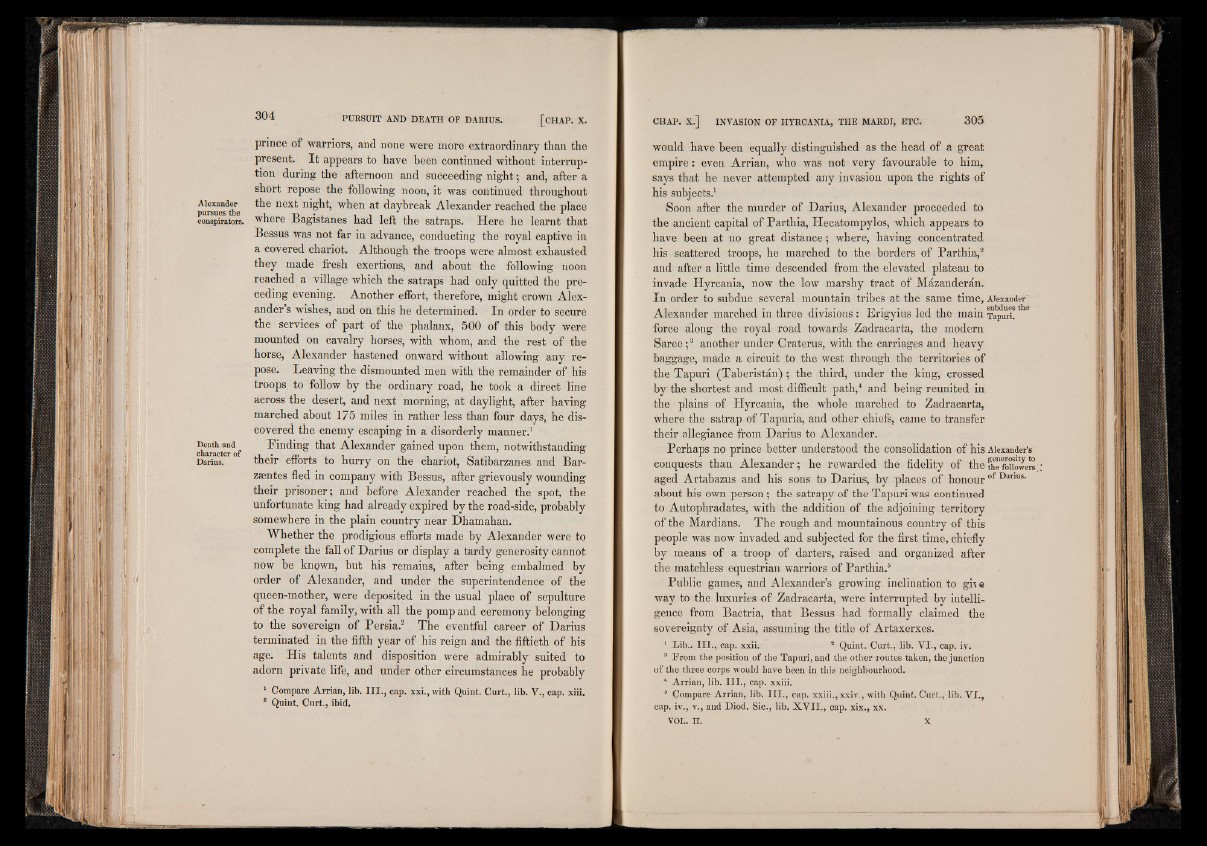
Alexander
pursues the
conspirators.
Death and
character of
Darius.
prince of warriors, and none were more extraordinary than the
present. It appears to have been continued without interruption
during the afternoon and succeeding night; and, after a
short repose the following noon, it was continued throughout
the next night, when at daybreak Alexander reached the place
where Bagistanes had left the satraps. Here he learnt that
Bessus was not far in advance, conducting the royal captive in
a covered chariot. Although the troops were almost exhausted
they made fresh exertions, and about the following noon
reached a village which the satraps had only quitted the preceding
evening. Another effort, therefore, might crown Alexander
s wishes, and on this he determined. In order to secure
the services of part of the phalanx, 500 of this body were
mounted on cavalry horses, with whom, and the rest of the
horse, Alexander hastened onward without allowing any repose.
Leaving the dismounted men with the remainder of his
troops to follow by the ordinary road, he took a direct line
across the desert, and next morning, at daylight, after having
marched about 175 miles in rather less than four days, he discovered
the enemy escaping in a disorderly m a n n e r .1
Finding that Alexander gained upon them, notwithstanding
their efforts to hurry on the chariot, Satibarzanes and Bar-
zsentes fled in company with Bessus, after grievously wounding
their prisoner; and before Alexander reached the spot, the
unfortunate king had already expired by the road-side, probably
somewhere in the plain country near Dhamahan.
Whether the prodigious efforts made by Alexander were to
complete the fall of Darius or display a tardy generosity cannot
now be known, but his remains, after being embalmed by
order of Alexander, and under the superintendence of the
queen-mother, were deposited in the usual place of sepulture
of the royal family, with all the pomp and ceremony belonging
to the sovereign of Persia.2 The eventful career of Darius
terminated in the fifth year of his reign and the fiftieth of his
age. His talents and disposition were admirably suited to
adorn private life, and under other circumstances he probably
1 Compare Arrian, lib. I I I . , cap. xxi., with Quint. Curt., lib. V., cap. xiii.
8 Quint. Curt., ibid.
would have been equally distinguished as the head of a great
empire: even Arrian, who was not very favourable to him,
says that he never attempted any invasion upon the rights of
his subjects.1
Soon after the murder of Darius, Alexander proceeded to
the ancient capital of Parthia, Hecatompylos, which appears to
have been at no great distance; where, having concentrated
his scattered troops, he marched to the borders of Parthia,8
and after a little time descended from the elevated plateau to
invade Hyrcania, now the low marshy tract of Mazanderan.
In order to subdue several mountain tribes at the same time, Alexander'
Alexander marched in three divisions : Erigyius led the main Tapuri?
force along the royal road towards- Zadracarta, the modern
Saree;3 another under Craterus, with the carriages and heavy
baggage, made a circuit to the west through the territories of
the Tapuri (Taberistan) ; the third, under the king, crossed
by the shortest and most difficult path,4 and being reunited in
the plains of Hyrcania, the whole marched to Zadracarta,
where the satrap of Tapuria, and other chiefs, came to transfer
their allegiance from Darius to Alexander.
Perhaps no prince better understood the consolidation of his Alexander’s
conquests than Alexander; he rewarded the fidelity of theth"followers ;
aged Artabazus and his sons to Darius, by places of honourof Danus-
about his own person; the satrapy of the Tapuri was continued
to Autophradates, with the addition of the adjoining territory
of the Mardians. The rough and mountainous country of this
people was now invaded and subjected for the first time, chiefly
by means of a troop of darters, raised and organized after
the matchless equestrian warriors of Parthia.5
Public games, and Alexander’s growing inclination to gi\ e
way to the luxuries of Zadracarta, were interrupted by intelligence
from Bactria, that Bessus had formally claimed the
sovereignty of Asia, assuming the title of Artaxerxes.
1 Lib.. I I I ., cap. xxii. 8 Quint. Curt., lib. V I., cap. iy.
3 From the position of the Tapuri, and the other routes taken, the junction
of the three corps would have been in this neighbourhood.
4 Arrian, lib. I I I ., cap. xxiii.
a Compare Arrian, lib. I I I ., cap. xxiii., xxiv., with Quint. Curt., lib. V I.,
cap. iv., v., and Diod. Sic., lib. X V I I ., cap. xix., xx.
VOL. II. X